Introduction to Pigmentation
Pigmentation refers to the coloring of your skin. When your body produces either too much or too little melanin, the pigment responsible for skin color, it can result in uneven skin tone. This is known as hyperpigmentation. In this article, we will explore some of the best home remedies for pigmentation and how they can help restore your skin’s natural glow.
Table of Contents
Overview of Pigmentation
Many people face skin pigmentation issues, which can make parts of their skin appear darker. This happens when melanin production in certain areas increases. Whether caused by sun damage, hormonal changes, or aging, hyperpigmentation is a common skin concern that affects people of all skin tones.
What is Hyperpigmentation?
Hyperpigmentation occurs when patches of skin become darker than the surrounding skin. This happens when the skin produces extra melanin, the pigment that gives skin its color. People often notice dark spots, age spots, or uneven skin tone. It can be caused by many factors, such as exposure to the sun, acne scars, or hormonal changes.
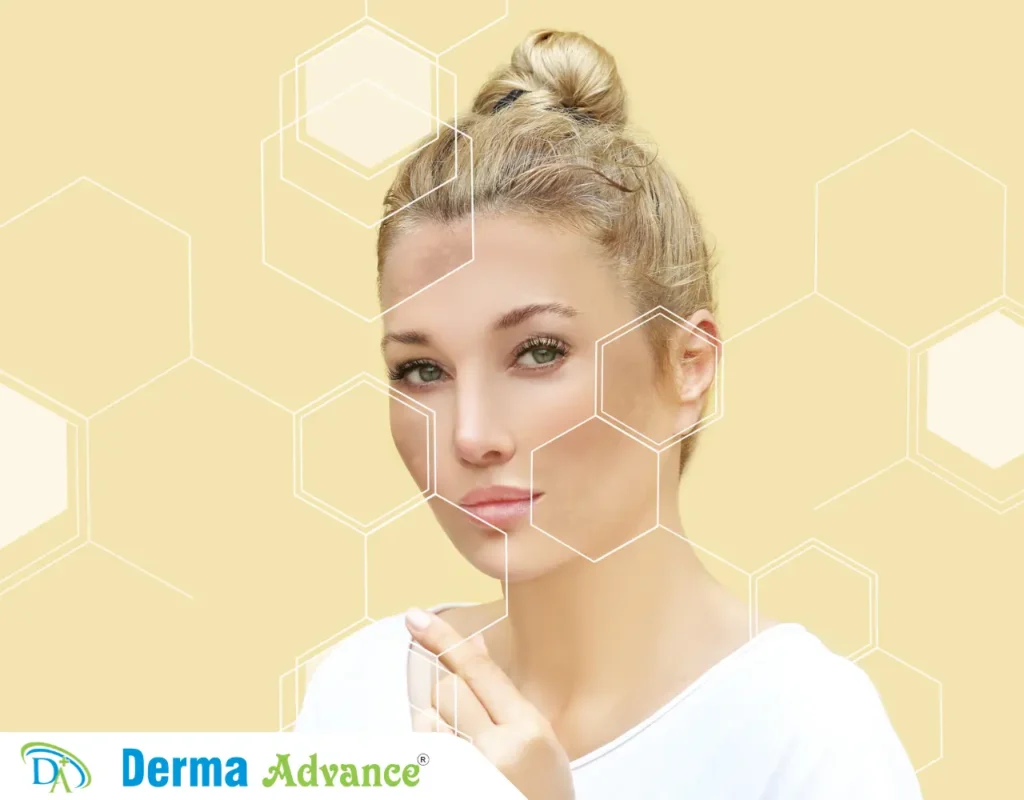
How Common is Pigmentation?
Skin pigmentation is very common. According to a study, over 80% of people will experience some form of hyperpigmentation during their lifetime. Many women experience it during pregnancy, known as melasma, while sunspots often affect people as they age. Hyperpigmentation can happen to anyone, but those with darker skin tones are more likely to experience it as their skin contains more melanin.
Why Natural Remedies?
Many people prefer using home remedies for pigmentation because they are natural, affordable, and free from harsh chemicals. While clinical treatments like chemical peels and laser therapies are effective, they can be expensive and may cause irritation. Natural remedies often use ingredients found in your kitchen, such as aloe vera, turmeric, and lemon juice, to help lighten dark spots and improve skin health. By choosing natural options, people can avoid side effects while treating pigmentation over time.
For more detailed information about melasma and how to prevent it, you can visit this American Academy of Dermatology.
Types of Pigmentation
Different types of pigmentation affect the skin in various ways. Understanding these types can help in finding the best home remedies for pigmentation. Below, we will discuss three main types of pigmentation: melasma, sunspots, and post-inflammatory hyperpigmentation (PIH).
Melasma
Melasma is a common skin condition that leads to brown or grayish-brown patches, typically on the face. It is more frequent in women, particularly during pregnancy or hormonal treatments.
Causes of Melasma
Melasma is primarily caused by hormonal changes, which is why it is often seen in pregnant women or individuals taking birth control pills. Sun exposure also plays a significant role in triggering melasma as UV rays can overstimulate the melanocytes (pigment-producing cells).
To reduce melasma naturally, limiting sun exposure and wearing protective clothing and sunscreen are essential steps. Learn more about protecting your skin from UV rays on Skin Cancer Foundation.
Symptoms of Melasma
Melasma appears as dark, symmetrical patches, usually on the cheeks, forehead, nose, and chin. These patches are often more visible after sun exposure and can range from light brown to deep gray-brown. The symmetry of the patches is a key feature that differentiates melasma from other forms of pigmentation.
Sunspots (Age Spots)
Sunspots, also known as age spots or liver spots, are flat brown or black spots that usually appear on areas frequently exposed to the sun, such as the face, hands, and shoulders. They are more common in older adults.
What Causes Sunspots?
Long-term exposure to the sun’s UV rays is the primary cause of sunspots. Over time, the UV rays damage the skin and increase melanin production, which leads to darkened patches, especially in older individuals. Age is also a factor, as the skin becomes less resilient to sun damage as we grow older.
How to Prevent Age Spots
Prevention is key when it comes to sunspots. Daily use of broad-spectrum sunscreen with an SPF of at least 30 can significantly reduce the risk of developing sunspots. Antioxidants, such as Vitamin C, can also protect the skin from free radical damage. Find some tips on choosing the right sunscreen at American Academy of Dermatology.
Post-Inflammatory Hyperpigmentation (PIH)
Post-Inflammatory Hyperpigmentation (PIH) occurs after an injury or inflammation to the skin, such as acne, eczema, or other skin conditions. The skin produces extra melanin in response to the damage, causing dark spots or patches.
Triggers of PIH
PIH can be triggered by acne breakouts, eczema flare-ups, or even physical injuries like cuts or burns. This type of pigmentation tends to be more common in people with darker skin tones, as their skin produces more melanin.
Treatment Options for PIH
Natural remedies such as aloe vera, turmeric, and honey can help soothe the skin and reduce the appearance of PIH over time. Over-the-counter treatments containing ingredients like niacinamide, retinoids, or Vitamin C can also be effective in lightening these dark spots. Always consult a dermatologist before starting any treatment. You can explore more treatment options for PIH on the National Center for Biotechnology Information (NCBI) website.
Causes of Pigmentation
The causes of pigmentation can vary widely, but the most common factors include sun exposure, hormonal changes, and genetics. Identifying the root cause is essential for finding effective home remedies for pigmentation.
Sun Exposure
Sun exposure is one of the leading causes of pigmentation. The harmful ultraviolet (UV) rays from the sun can trigger excessive melanin production, leading to dark spots, commonly known as sunspots or age spots.
UV Damage
When your skin is exposed to UV rays, it responds by producing more melanin as a natural defense mechanism. This is especially true for individuals who spend a lot of time outdoors without proper sun protection. Over time, this increased melanin production can result in the appearance of dark spots on the skin.
UV rays not only accelerate the aging process but also contribute significantly to uneven skin tone and hyperpigmentation. Prolonged exposure to the sun increases the chances of developing pigmentation, especially in areas like the face, neck, and hands.
Prevention with Sunscreen
The most effective way to prevent pigmentation caused by UV exposure is to apply sunscreen daily. Choose a broad-spectrum sunscreen with at least SPF 30 and reapply every two hours when outdoors. Sunscreen should be used even on cloudy days to protect your skin from hidden UV rays.
For more tips on sun protection, check out this guide by the American Academy of Dermatology.
Hormonal Changes
Hormonal fluctuations can also play a major role in pigmentation. Hormones can affect melanin production, leading to conditions like melasma, which causes dark patches on the face.
Pregnancy & Birth Control
Melasma is often referred to as the “mask of pregnancy” because it commonly occurs in pregnant women. Hormonal changes during pregnancy stimulate excess melanin production, leading to brown patches on the face. Women who take oral contraceptives may experience similar pigmentation issues due to the hormonal imbalance these pills can cause.
Women undergoing hormone therapy may also be susceptible to pigmentation issues. It’s important to protect the skin during pregnancy or while on birth control by using sunscreen and seeking natural remedies.
Menopause and Hormone Replacement
Hormonal changes during menopause can lead to an imbalance in melanin production. Women undergoing hormone replacement therapy (HRT) may notice dark spots or patches on their skin due to these fluctuations. Limiting sun exposure and considering natural remedies can help manage pigmentation during this phase.
Genetics and Skin Type
Some individuals are genetically predisposed to pigmentation. Your skin type, as determined by the Fitzpatrick scale, also influences how susceptible you are to pigmentation issues.
Why Some People Are More Prone
Certain skin types, particularly darker skin tones, are more prone to pigmentation due to the higher amount of melanin in their skin. Additionally, genetic factors can predispose individuals to develop conditions like melasma or post-inflammatory hyperpigmentation (PIH) more easily than others.
Understanding your skin type and genetic background can help in selecting the right treatment and home remedies for pigmentation. Learn more about the genetic factors of pigmentation on this study from NCBI.
Importance of Sun Protection
Sun protection is crucial in preventing pigmentation and maintaining overall skin health. Proper sun care can significantly reduce the risk of developing dark spots and other pigmentation issues.
The Role of Sunscreen
Sunscreen acts as a barrier between your skin and the harmful UV rays from the sun. It is an essential step in any skincare routine, especially for individuals prone to pigmentation.
How UV Rays Affect Pigmentation
UV rays can be categorized into two main types: UVA and UVB. UVA rays penetrate deeply into the skin, causing premature aging and exacerbating existing pigmentation. On the other hand, UVB rays are responsible for sunburn and can directly increase melanin production, leading to dark spots.
Understanding the difference between these two types of rays is important for effective sun protection. Both types contribute to skin damage and pigmentation issues, making sunscreen a vital tool for skin health.
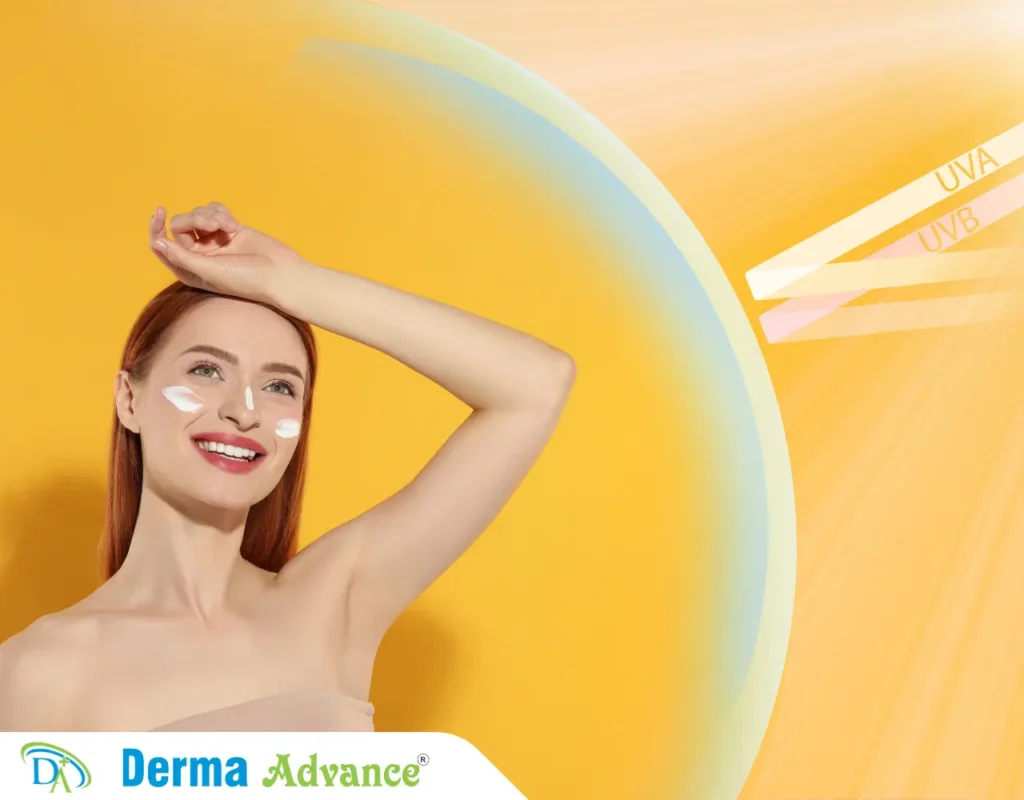
Choosing the Right Sunscreen
When selecting a sunscreen, look for a broad-spectrum formula that protects against both UVA and UVB rays. An SPF of 30 or higher is recommended for daily use. You can choose between mineral sunscreens (which contain zinc oxide or titanium dioxide) and chemical filters (which absorb UV rays).
Mineral sunscreens are often better tolerated by sensitive skin, while chemical sunscreens may offer a lighter feel. Consider your skin type and preferences when making a choice.
Daily Protection Practices
In addition to using sunscreen, adopting daily protective practices can further reduce your risk of pigmentation.
Protective Clothing
Wearing protective clothing is an effective way to shield your skin from the sun’s rays. This includes wide-brimmed hats, sunglasses with UV protection, and SPF-rated clothing designed to block harmful UV radiation.
Choosing fabrics with a tight weave and dark colors can enhance sun protection. Look for clothing labeled with an Ultraviolet Protection Factor (UPF) for extra assurance. For more information on protective clothing, check out CDC guidelines.
Sun Avoidance Tips
To minimize sun exposure, it’s best to avoid the sun during peak hours, typically between 10 a.m. and 4 p.m. During these hours, the sun’s rays are the strongest, and the risk of skin damage increases.
If you must be outside during these hours, seek shade whenever possible and reapply sunscreen every two hours. This proactive approach will help protect your skin from pigmentation and other sun-related issues.
Top 10 Natural Home Remedies for Pigmentation
Pigmentation issues such as dark spots, melasma, and uneven skin tone can be challenging to manage. Natural remedies can offer effective solutions without the harshness of chemical treatments. Below are ten remedies that have been recognized for their efficacy in addressing pigmentation issues, supported by research and traditional practices.
1. Aloe Vera
Aloe Vera is renowned for its soothing and healing properties. The key component, aloin, has been shown to have skin-lightening effects. It not only helps reduce pigmentation but also hydrates the skin and aids in healing.
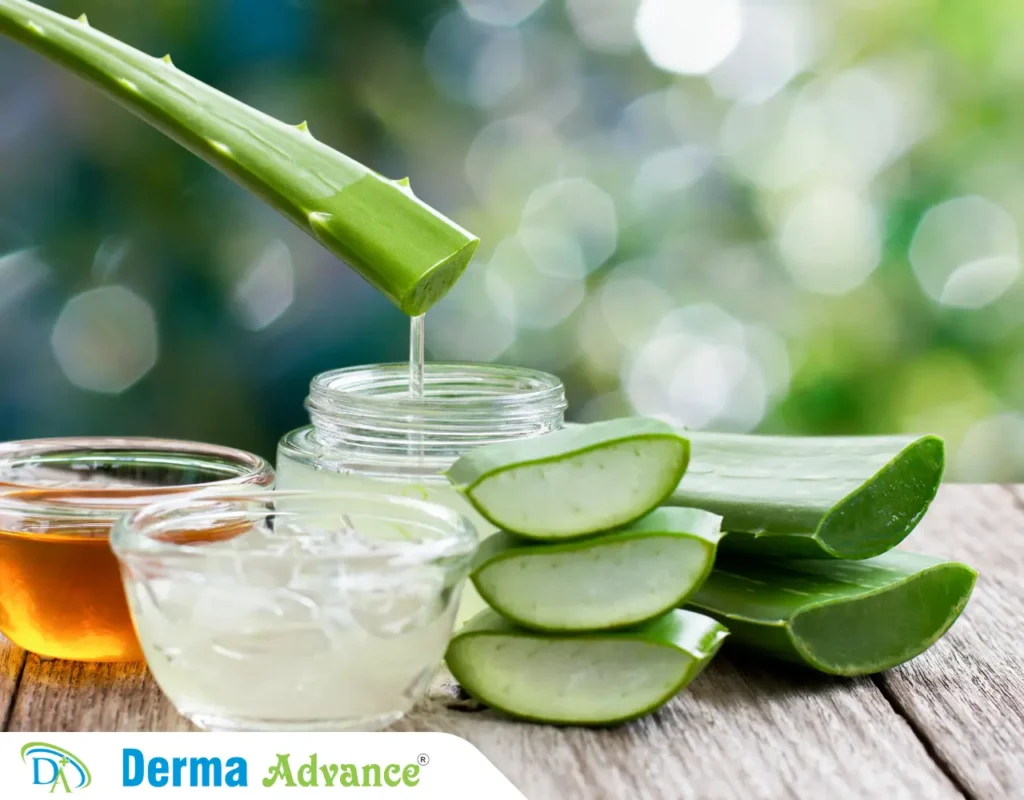
How to Use:
- Extract fresh gel from an Aloe Vera leaf. Ensure you’re using the gel directly from the plant for maximum potency.
- Apply the gel directly to the pigmented areas of your skin.
- Leave it on overnight and rinse off with lukewarm water in the morning.
- For added benefits, mix Aloe Vera gel with a few drops of lemon juice.
Further Reading: Healthline – Aloe Vera for Face
2. Turmeric
Turmeric is a powerful natural anti-inflammatory and antioxidant, primarily due to its active compound curcumin. Curcumin can inhibit the enzyme responsible for melanin production, thereby helping to lighten dark spots.
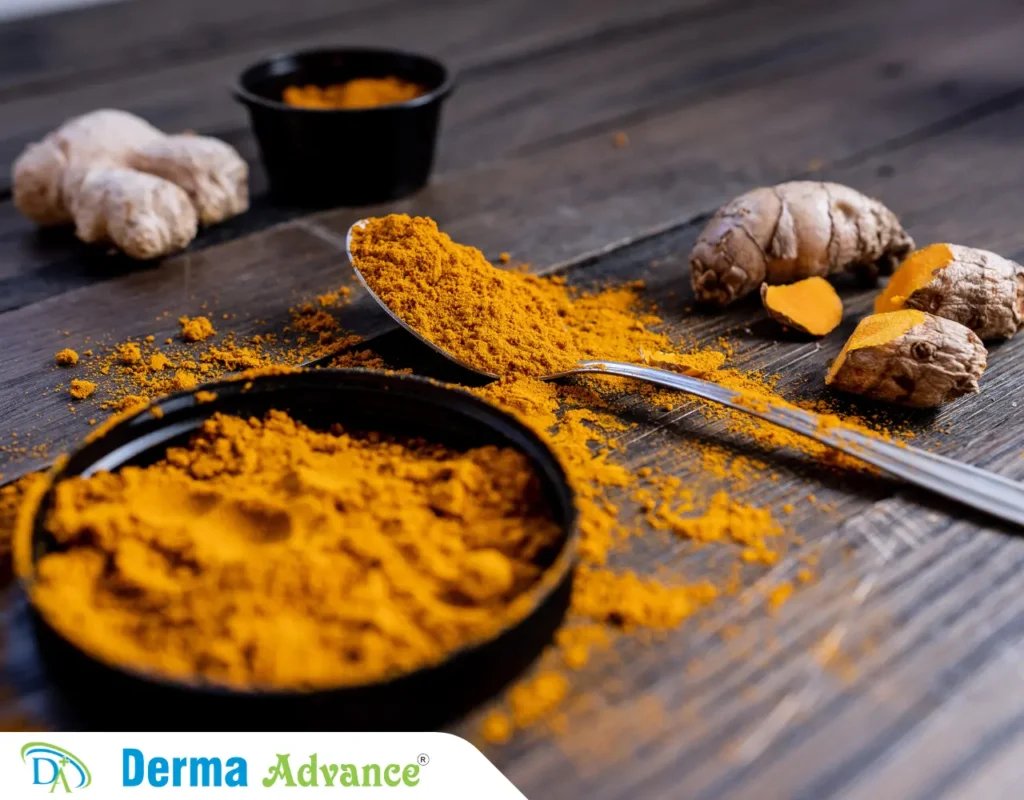
How to Make a Turmeric Mask:
- Mix one teaspoon of turmeric powder with honey or yogurt to create a paste. Honey moisturizes the skin, while yogurt contains lactic acid that helps with exfoliation.
- Apply the mixture to the affected areas and leave it on for 20-30 minutes.
- Rinse with lukewarm water. Use this mask 2-3 times a week for optimal results.
Explore more about turmeric’s benefits: Medical News Today – Benefits of Turmeric
3. Green Tea Extract
Green tea is packed with antioxidants, particularly epigallocatechin gallate (EGCG), which has been shown to reduce melanin production and improve skin tone. Its anti-inflammatory properties also help soothe irritated skin.
How to Use Green Tea for Hyperpigmentation:
- Steep a green tea bag in hot water for about 5 minutes and allow it to cool.
- Soak a cotton ball in the cooled tea and apply it to the dark spots.
- Leave it on for 30 minutes before rinsing with water.
Learn more about green tea’s benefits: Everyday Health – Green Tea for Skin
4. Licorice Extract
Licorice extract contains glabridin, which effectively inhibits tyrosinase, the enzyme involved in melanin production. It is particularly effective for melasma and sun spots.
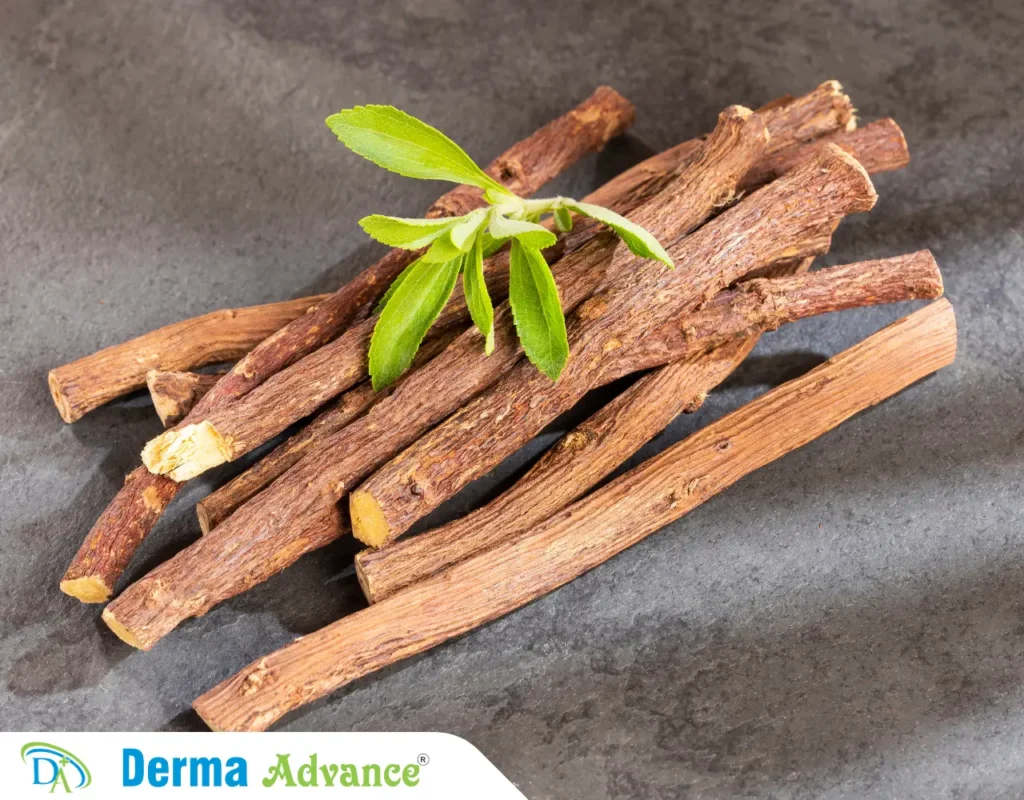
Application of Licorice Extract:
- Look for creams or serums that contain licorice extract.
- Apply the product directly to the pigmented areas, preferably after cleansing your skin.
- For best results, use it twice daily.
For more on licorice extract’s effectiveness: Byrdie – Licorice Extract for Skin
5. Lemon Juice
Lemon juice is rich in citric acid and vitamin C, known for their skin-lightening and exfoliating properties. It helps to remove dead skin cells and reduce pigmentation.
Caution with Lemon Juice:
- Apply diluted lemon juice (mix with equal parts water) to the affected areas using a cotton ball.
- Leave it on for 10-15 minutes before rinsing off with lukewarm water.
- Use sunscreen after application as lemon juice can make your skin sensitive to sunlight.
6. Raw Potato
Raw potato contains catecholase, an enzyme that has natural bleaching properties and can lighten dark spots effectively.
How to Use Potato Juice:
- Cut a fresh potato into slices or grate it to extract the juice.
- Apply the potato slices or juice directly to the pigmented areas.
- Leave it on for about 15-20 minutes before rinsing off.
For more details on potato benefits: Stylecraze – Potato for Skin
7. Apple Cider Vinegar
Apple cider vinegar contains acetic acid, which acts as a natural exfoliant and helps lighten dark spots. It also balances the skin’s pH level.
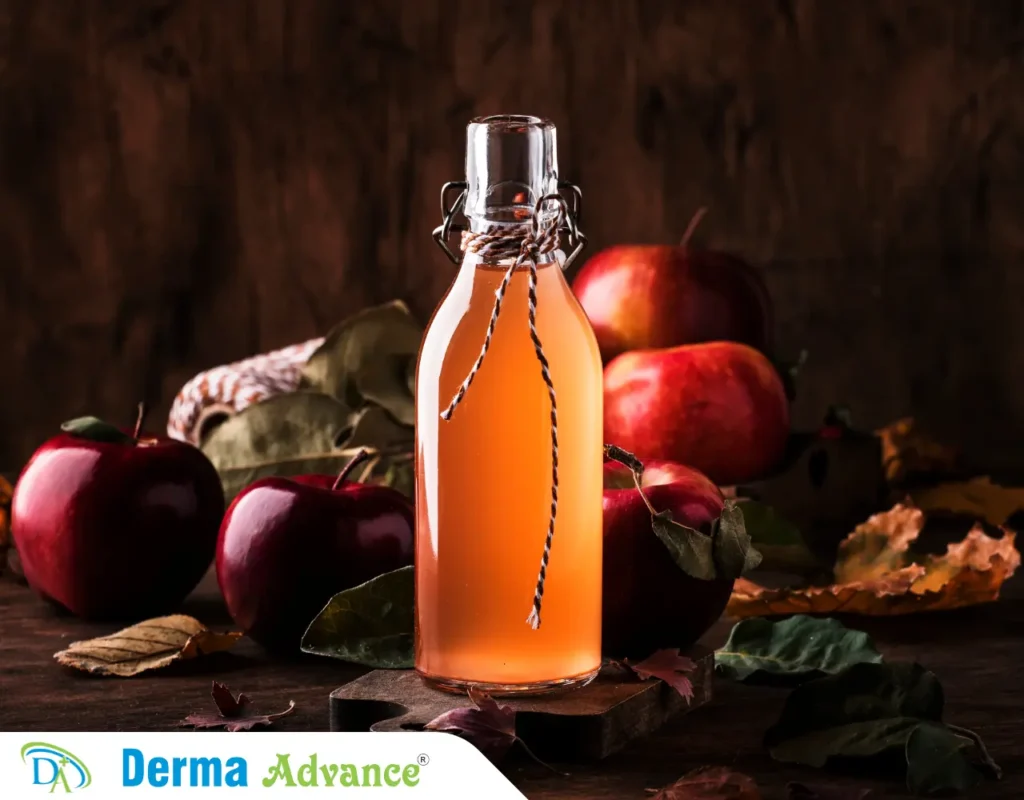
How to Use Apple Cider Vinegar:
- Mix equal parts of ACV and water in a bowl.
- Apply the mixture to the affected areas with a cotton ball.
- Leave it on for 5-10 minutes before rinsing off. Avoid using it too frequently to prevent skin irritation.
For more on the benefits of ACV: Healthline – Apple Cider Vinegar for Skin
8. Papaya
Papaya contains papain, an enzyme that helps exfoliate the skin and remove dead skin cells, promoting a brighter complexion.
How to Use Papaya Paste:
- Mash ripe papaya into a smooth paste.
- Apply it evenly over your face and neck.
- Leave it on for 20-30 minutes before rinsing off with lukewarm water.
Learn more about papaya’s benefits: Organic Facts – Papaya Benefits
9. Vitamin E Oil
Vitamin E is a potent antioxidant that helps in skin repair and rejuvenation. It can help fade dark spots and improve overall skin texture.
How to Apply Vitamin E for Pigmentation:
- Puncture a Vitamin E capsule and squeeze the oil onto your fingertips.
- Gently massage the oil onto the pigmented areas.
- Leave it overnight for maximum absorption.
For more information, check: Byrdie – Vitamin E for Skin
10. Almond and Milk Paste
Almonds are rich in nutrients, and when combined with milk, they create a potent mix that can lighten skin pigmentation due to lactic acid in milk.
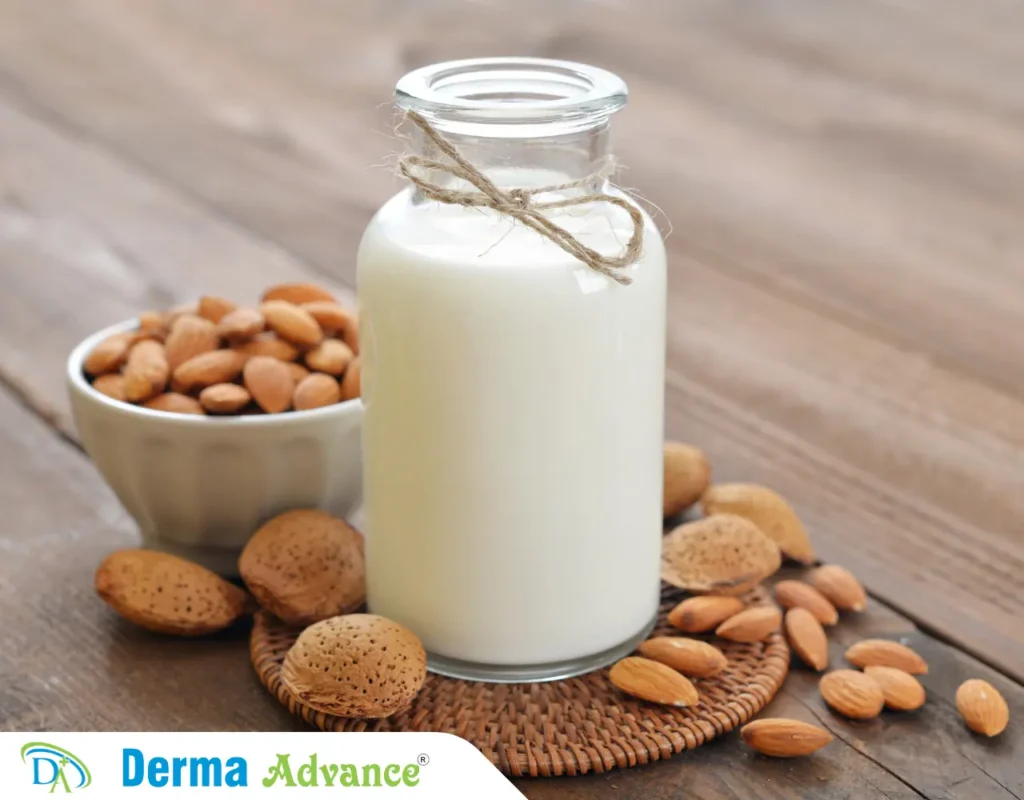
How to Make Almond Milk Paste:
- Soak 5-6 almonds overnight and peel them in the morning.
- Grind the almonds to a fine paste and mix it with 2 tablespoons of milk.
- Apply the paste to your face and leave it on for 30 minutes before rinsing off with lukewarm water.
Learn more about the benefits of almonds: Healthline – Benefits of Almonds
Additional Tips for Managing Pigmentation at Home
Diet for Skin Health
A well-balanced diet plays a significant role in maintaining healthy skin and managing pigmentation issues. Certain nutrients can help improve skin health and reduce pigmentation.
Antioxidants for Pigmentation
Antioxidants are crucial for protecting skin cells from damage caused by free radicals. They can help inhibit melanin production, thereby reducing the appearance of dark spots and uneven skin tone. Key antioxidants for skin health include:
- Vitamin C: This vitamin helps brighten the skin and promotes collagen production, essential for skin elasticity. It can be found in citrus fruits, strawberries, and bell peppers.
- Vitamin E: Known for its moisturizing properties, Vitamin E also protects the skin from oxidative stress. Sources include nuts, seeds, and green leafy vegetables.
- Omega-3 Fatty Acids: These fatty acids reduce inflammation and support skin barrier function. Foods rich in omega-3s include fatty fish like salmon, flaxseeds, and walnuts.
For further reading on antioxidants and their role in skin health, check: Healthline – Antioxidants 101.
Foods to Eat
Incorporating specific foods into your diet can significantly enhance skin health and assist in pigmentation management:
- Leafy Greens: Spinach, kale, and other leafy greens are rich in vitamins and minerals that promote skin health.
- Citrus Fruits: Oranges, lemons, and grapefruits are packed with Vitamin C, which is vital for skin repair and rejuvenation.
- Nuts: Almonds, walnuts, and hazelnuts provide essential fatty acids and antioxidants that nourish the skin.
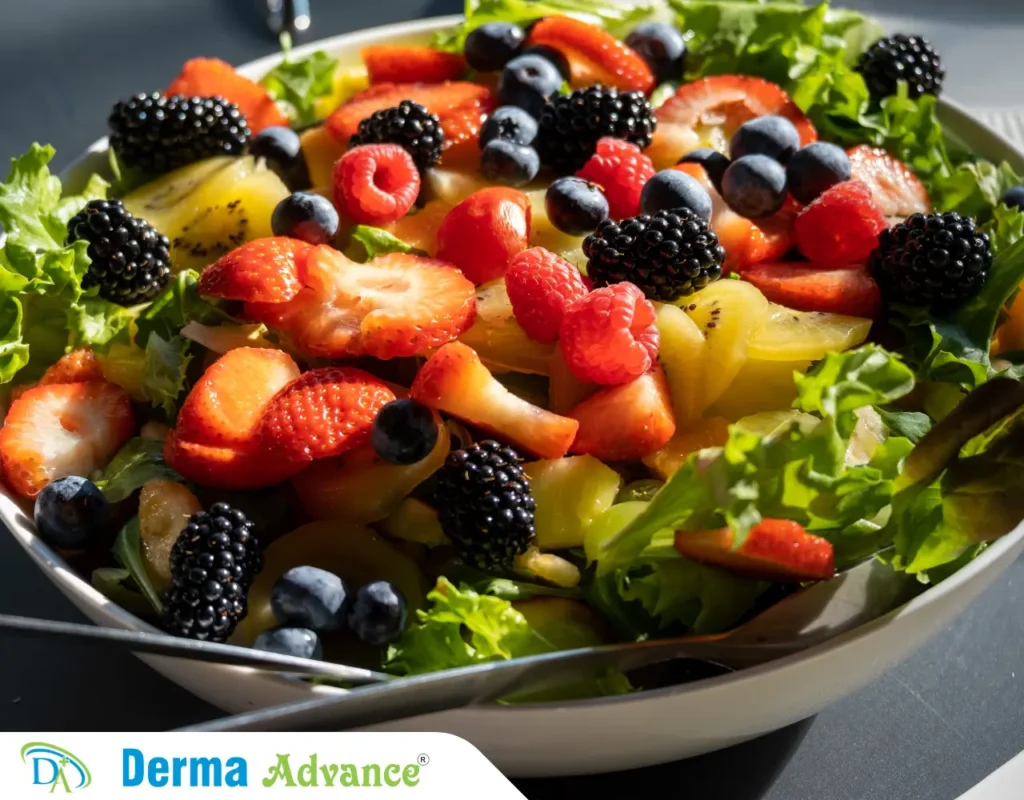
For more insights on foods for skin health, visit: Healthline – Foods for Healthy Skin.
Hydration
Staying well-hydrated is essential for overall health and particularly important for skin health. Proper hydration helps maintain skin elasticity and prevents dryness, which can exacerbate pigmentation issues.
Importance of Drinking Water
Water plays a key role in flushing out toxins from the body and ensuring optimal skin hydration. Dehydrated skin may become dull and more prone to pigmentation. Aim to drink at least 8-10 glasses of water daily, and consider increasing your intake during hot weather or after exercise.
Exfoliation
Regular exfoliation is crucial for managing pigmentation as it helps remove dead skin cells that can trap pigment and lead to a dull complexion.
How Regular Exfoliation Helps
By sloughing off dead skin cells, exfoliation reveals healthier skin underneath and can help to fade dark spots over time. It promotes cell turnover, allowing for a more even skin tone.
Exfoliating Products
There are various exfoliating products you can incorporate into your skincare routine:
- Mild Scrubs: Choose gentle scrubs with natural ingredients like sugar or coffee grounds to avoid irritation.
- AHA/BHA Products: Alpha hydroxy acids (AHAs) and beta hydroxy acids (BHAs) are effective chemical exfoliants that can help brighten the skin. AHAs are water-soluble and great for dry skin, while BHAs are oil-soluble and work well for oily and acne-prone skin.
Home Remedies to Avoid
Undiluted Lemon Juice
Lemon juice is often touted as a natural remedy for pigmentation due to its high vitamin C content and acidic properties. However, using it in its undiluted form can be harmful to your skin.
Why It’s Harmful:
Applying undiluted lemon juice can lead to skin irritation, redness, and sensitivity. The acidity of lemon juice may strip away the skin’s natural oils, leading to dryness and potential damage. Moreover, exposure to sunlight after using lemon juice can cause photosensitivity, increasing the risk of sunburn and pigmentation issues rather than alleviating them. According to a study published in the *Journal of the American Academy of Dermatology*, citric acid can provoke irritant contact dermatitis, especially when applied in high concentrations .
Safe Alternatives:
Instead of using undiluted lemon juice, consider diluted lemon juice or vitamin C serums. Diluting lemon juice with water (mixing equal parts) can help mitigate irritation. Vitamin C serums, which are formulated for skin application, provide similar benefits without the harshness of lemon juice. They are often stabilized and combined with other beneficial ingredients, making them a safer option. Look for serums containing L-ascorbic acid, which is effective in brightening the skin and reducing pigmentation .
For more information on safe use of lemon juice, check out Healthline.
Baking Soda
Baking soda is frequently suggested as a home remedy for exfoliation and skin brightening. However, it can be too harsh for facial skin and should generally be avoided.
Why Baking Soda is Harsh:
Baking soda has a high pH level, which can disrupt the skin’s natural acidity (the acid mantle). This disruption can lead to skin irritation, dryness, and inflammation. The skin barrier may become compromised, making it more susceptible to damage from environmental factors . Additionally, over-exfoliation from baking soda can cause micro-tears in the skin, worsening pigmentation issues rather than improving them .
Gentler Exfoliants to Use Instead:
Instead of baking soda, consider using gentler exfoliants like oatmeal or sugar scrubs, which are less abrasive and can effectively remove dead skin cells without damaging the skin barrier. Chemical exfoliants containing alpha hydroxy acids (AHAs) like glycolic acid or beta hydroxy acids (BHAs) like salicylic acid are also excellent alternatives. These ingredients provide a more controlled exfoliation process, helping to brighten the skin and reduce pigmentation without the risks associated with baking soda .
Learn more about the risks of using baking soda on your skin at Byrdie.
Conclusion and Expert Advice
Summary of Remedies
In summary, while many natural home remedies for pigmentation show promise, it’s important to remember that patience is key. Remedies like aloe vera, turmeric, and green tea can provide gentle and effective solutions for skin pigmentation over time. However, results may not be immediate, and consistency in application is crucial. Regular use, combined with a comprehensive skincare routine, will yield the best outcomes for your skin’s appearance.
When to See a Dermatologist
While home remedies can be beneficial, there are times when professional treatment may be necessary. If you notice persistent pigmentation that doesn’t respond to natural remedies, or if it worsens, it’s advisable to consult a dermatologist. Conditions such as melasma or post-inflammatory hyperpigmentation may require targeted treatments such as prescription creams, chemical peels, or laser therapy. At Derma Advance, our experienced dermatologists specialize in personalized skin care, offering various treatment options to address pigmentation effectively. For more information, consider scheduling a consultation to explore suitable options for your skin type.
Encourage Consistency
To achieve the best results from your chosen remedies, consistency is essential. Make a habit of applying your chosen treatments regularly, and don’t be discouraged if progress seems slow at first. Like any skincare regimen, achieving significant changes in pigmentation can take weeks or even months.
Combine with Sunscreen and Healthy Lifestyle
Finally, it’s crucial to adopt a holistic approach by combining your remedies with daily sunscreen application and maintaining a healthy lifestyle. Protecting your skin from UV damage is vital in preventing further pigmentation. Use a broad-spectrum sunscreen with at least SPF 30 daily, even on cloudy days. Additionally, a balanced diet rich in antioxidants and staying hydrated can support skin health from within. Lifestyle changes, such as reducing stress and avoiding smoking, can also significantly impact your skin’s appearance.
For personalized advice and professional treatment options for pigmentation, visit Derma Advance, where our team is dedicated to helping you achieve healthy, radiant skin.
Frequently Asked Questions (FAQs)
What is pigmentation, and how does it occur?
Pigmentation refers to the coloring of the skin, determined by the amount of melanin produced by skin cells called melanocytes. When these cells become overactive, they produce excess melanin, leading to darker patches, known as hyperpigmentation. Common causes include sun exposure, hormonal changes, and skin inflammation.
What are the main types of pigmentation disorders?
There are several types of pigmentation disorders, including:
Melasma: This is characterized by brown or gray-brown patches on the face, often triggered by hormonal changes during pregnancy or the use of oral contraceptives.
Sunspots (Age Spots): Flat, brown or black spots that appear on sun-exposed areas of the skin due to prolonged UV exposure.
Post-Inflammatory Hyperpigmentation (PIH): This occurs after skin injury or inflammation, such as acne or eczema, where the affected area becomes darker as it heals.
What natural remedies are effective for treating pigmentation?
Natural remedies can help lighten pigmentation over time. Here are some effective options:
Aloe Vera: Contains aloin, which has skin-lightening properties and helps soothe the skin.
Turmeric: Curcumin in turmeric helps inhibit melanin production. A simple mask can be made by mixing turmeric with honey or yogurt.
Lemon Juice: Known for its natural bleaching properties due to citric acid, but it must be used cautiously to avoid irritation.
Green Tea: Rich in antioxidants, green tea can help reduce pigmentation when applied topically as a toner.
Are there any home remedies I should avoid for pigmentation?
Yes, certain home remedies can be harmful, such as:
Undiluted Lemon Juice: It can cause irritation and increase sun sensitivity. Always dilute it with water or use Vitamin C serums instead.
Baking Soda: This can disrupt the skin’s pH balance, leading to irritation. Instead, consider gentler exfoliants like oatmeal or sugar scrubs.
How long does it take for natural remedies to show results?
Natural remedies typically require consistent use over several weeks or even months to see noticeable results. Patience is essential, as everyone’s skin reacts differently.
What precautions should I take when using home remedies?
Patch Test: Always perform a patch test on a small skin area to check for any adverse reactions.
Sun Protection: Use sunscreen daily, as many natural remedies can make your skin more sensitive to sunlight.
Consult a Professional: If irritation occurs or if pigmentation worsens, consult a dermatologist for tailored advice.
When should I consider professional treatments for pigmentation?
If home remedies do not yield results after several months or if the pigmentation is extensive, it may be time to seek professional treatments. Options include:
Chemical Peels: These can help remove the top layer of skin, reducing pigmentation.
Laser Therapy: Targets melanin in the skin and can provide quicker results.
Prescription Creams: Dermatologists can prescribe topical treatments like hydroquinone or retinoids for more effective results.
How can lifestyle changes impact pigmentation?
Making healthy lifestyle choices can greatly influence skin health and pigmentation. Important factors include:
Diet: Consuming a diet rich in antioxidants (fruits and vegetables) can promote healthy skin.
Hydration: Drinking plenty of water helps maintain skin elasticity and clarity.
Avoiding Smoking: Smoking can contribute to skin discoloration and premature aging.
Are there any specific dietary changes that can help with pigmentation?
Incorporating foods rich in vitamins C and E can aid in skin repair and reduce pigmentation. Citrus fruits, nuts, seeds, and leafy greens are excellent choices. Omega-3 fatty acids, found in fish and flaxseeds, can also improve skin health.
Can pigmentation affect all skin types equally?
While pigmentation can affect anyone, individuals with darker skin tones are generally more prone to certain types of hyperpigmentation, like PIH and melasma. However, anyone can experience pigmentation issues, especially due to sun exposure or hormonal changes.

